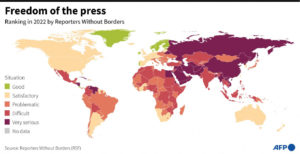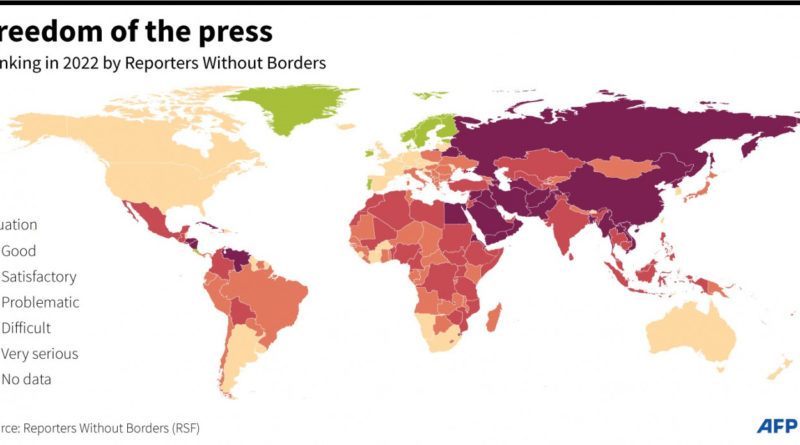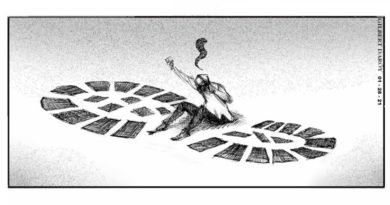OP-ED OPINION – EDITORIAL | Rethinking our press freedom
A world map showing the different states of press freedom by countries and territories, compiled by Reporters Without Borders. (AFP/-)
.
A world map showing the different states of press freedom by countries and territories, compiled by Reporters Without Borders. (AFP/-)
.
Editorial board
The Jakarta Post
Jakarta

Remembering the virtues of press freedom remains as relevant today as when the United Nations General Assembly declared in 1993 to mark May 3 as World Press Freedom Day. Thirty years later, we may want to rethink how to convey the message effectively, considering the massive disruption that information technology has caused to the way journalists and news media outlets operate.
It’s certainly a completely different and more challenging environment.
Those who are concerned about freedom of speech and other basic rights should never tire in reminding on this day that a free and independent press is indispensable to a functioning democracy. The message is more important since the world is becoming less democratic.
UN Secretary-General António Guterres in his speech to mark World Press Freedom Day said, “Freedom of the press is the foundation of democracy and justice. It gives all of us the facts we need to shape opinions and speak truth to power. But in every corner of the world, freedom of the press is under attack.”
Many countries have reverted to authoritarianism, while in others, including established democracies, there are signs of deterioration in the quality of freedom.
The ongoing digital transformation has a lot to do with this. For one, the platforms on which the news media operate have changed. Print and broadcast that dominated the landscape are now peripheral to the digital media, the prime if not the only source of news and information for most people. These “legacy” media have made the switch only to find a fiercely competitive landscape that is filled with so many new players.
The rise of social media has allowed millions more people around the world to disseminate “news” and information, without practicing the strict disciplines and ethics in journalism. Misinformation and “news” that have not been subjected to verification are now rampant and some even going viral in the digital world, and they are eclipsing the news that journalists provide.
Press freedom comes under even more attacks from those who find the internet and social media convenient, powerful and effective weapons to silence critics. The use of paid bots (“buzzers” in Indonesian net parlance) is rampant to bully and harass people, and to incite violence that could lead to real physical harm. Many Indonesian journalists and activists critical of the government have been the target of doxing, the practice of disclosing personal information that threatens them and their families.
Governments find they can shut down or slow down internet connections, and increasingly in many countries the ability to order tech platforms to take content down on their behalf. These technological companies, whose failure in putting in place an effective content moderation mechanism to screen out bad from good content, willingly collaborate with governments as this effectively absolves them of responsibility for what appears on their platforms.
Some 10 to 15 years ago, when social media began, many talked optimistically about digital democracy, especially when it led to the Arab Spring. That mood has changed and now we are seeing the rise of digital authoritarianism.
News media companies are finding the digital transformation compromising their ability to perform their duty as the “fourth pillar of democracy”. They have yet to come up with effective ways to raise revenue in the digital world. The old business model of relying on ads income to finance their operation worked effectively in the analog world, but in the digital world, the lion’s share of ad revenues goes to the global tech companies that offer precise targeting for advertisers. Many traditional news outlets have closed, and many more are cutting back the size of their staff and operation.
The digital transformation has led to new forms of censorship that are more subtle, draconian and deadlier. And this is coming at a time when journalism and the media outlets are struggling for survival and existence. The message of World Press Freedom Day needs to be tailored to this new condition, and more importantly, to come with answers. Otherwise, there will not be much to commemorate, let alone celebrate, on May 3 next year and the years after.
.
EDITOR IN CHIEF
 Ads by: Memento Maxima Digital Marketing
Ads by: Memento Maxima Digital Marketing
@[email protected]
SPACE RESERVE FOR ADVERTISTMENT


 Memento Maxima Digital Marketing
Memento Maxima Digital Marketing







